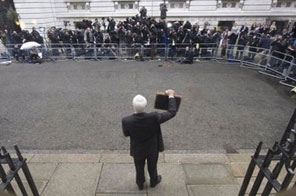Britain hits rich in pre-election budget
LONDON: Britain's finance minister vowed to hike taxes on the rich to help the poor hit by the global downturn, and to cut borrowing targets in a budget unveiled weeks before a knife-edge election.
Alistair Darling on Wednesday warned that growth would be weaker than expected in 2011 as Britain recovered from a record recession, as he unveiled the last budget before the general election, which is expected on May 6.
Opinion polls suggest that the election will be a tight contest between the ruling Labour Party and the main opposition Conservatives.
"Those who have benefited the most from the strong growth in incomes in past years should now pay their fair share of tax," Chancellor of the Exchequer Darling said.
"Looking across all the tax rises since the beginning of this global crisis, 60 percent of them will be paid for by the top five percent of earners."
Darling revealed that 2.0 billion pounds (2.2 billion euros, 3.0 billion dollars) raised from a supertax on bankers' bonuses would be ploughed into a programme to help boost recovery.
This 2.5-billion-pound "growth package" would "help small business, promote innovation, invest in national infrastructure", Darling told parliament.
Economists played down its importance.
"As the headline 2.5-billion-pound package is worth just 0.2 percent of GDP, it will not have a significant impact on the economic outlook," said Daiwa economist Colin Ellis.
"Instead, it seems designed to put some clear water between the Labour government and Tory opposition ahead of the expected election in May, allowing the government to paint itself as investing in the recovery rather than cutting too sharply and risking a double dip."
There was more bad news for high earners, who already face a 50-percent income tax rate on earnings over 150,000 pounds this year.
Britons with annual incomes in excess of 100,000 pounds would have their annual tax-free allowance gradually withdrawn, said Darling.
But economists argue that further tax hikes and spending cuts will eventually be needed to fix the public purse, which has been hit by banking bailouts and recession-hit taxation revenues.
In a measure aimed at helping first-time property buyers struggling to get a rung on the housing ladder, Darling said people buying a property would not have to pay tax on properties costing less than 250,000 pounds.
That was double the previous ceiling.
The new measure would be paid for by increasing tax payments on properties costing more than 1.0 million pounds, he said.
The chancellor also announced measures to allow more of Britain's poorest people access to basic bank account facilities. According to Treasury figures, 1.75 million adults do not yet have them.Related article: Britain plans 'green' investment bank
The chancellor cut his economic growth forecast for 2011 to 3.0-3.5 percent but held his prediction of 1.0-1.5 percent expansion this year.
He also trimmed his official borrowing target to 167 billion pounds for the current financial year, which runs until the end of this month.
That was equivalent to 11.8 percent of GDP but was lower than the previous estimate of 178 billion pounds.
In a vitriolic response to the budget, the Conservatives' leader David Cameron lashed out at the government for having helped guide Britain into the worst economic downturn in modern history.
"It is time this country had a radical change of direction," he added.
Some British newspapers saw the budget as manoeuvring ahead of the election: the Times labelled it "breathtakingly political."
"The chancellor delivered a skilful political budget yesterday. But this was a time for sound economics, not for playing politics," said the paper.
The Daily Mail said the change on property taxes was a "clear pre-election bribe just weeks before Gordon Brown goes to the country."






